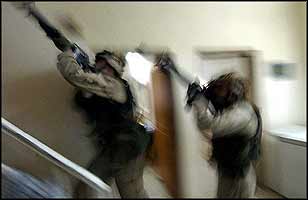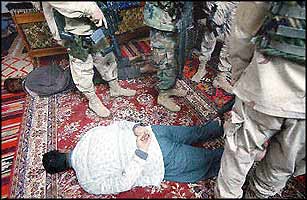Lies and Beatings in 'Free' Iraq
Dahr Jamail for the World Crisis Web
Yesterday in Khaldiya, 60 miles west of Baghdad, a powerful roadside bomb exploded killing US soldiers. Iraqi civilians were killed by US soldiers? gunfire during the aftermath. However, questions about the conflicting numbers as to the number of dead US soldiers and Iraqi civilians remain. In a CENTCOM press release for the incident, the US Military claims that three task force “All American” soldiers were killed in the blast by the Improvised Explosive Device (IED), and one Iraqi killed. The press release also states that one soldier and several Iraqis were wounded.
Witnesses at the scene today told a very different story, as did personnel at the Ramadi Hospital where the civilian Iraqi casualties were taken. Mohammed (last name withheld), a 25 year old Iraqi man who lives near the scene, said, “I saw 12 US soldiers killed. Body parts were everywhere. There were also at least 5 injured.”

Media reports say two military vehicles were destroyed in the attack.
So why was this bus bullet-ridden and gutted by fire?
He and several other witnesses said they watched as the US vehicle was exploded by the IED, then other soldiers opened up with gunfire, shooting everything in sight. Hammad Naif Ermil, driving a large truck, was shot and killed, as were other Iraqis riding in a bus behind him that was riddled with American bullet holes.
Ali (last name withheld), an Iraqi Policeman who witnessed the incident, said, “I saw 12 dead US soldiers. They put them in black body bags and flew them out by helicopters.” Ali said, “We tried to help get the man out of the bus, but the Americans wouldn?t let us. He died because they wouldn?t let us get him out.”
A man who also lives near the scene of the incident, Abdul Ahkman, said, “I saw 12 US soldiers killed and flown away by their helicopters. We want the Americans to leave. They said they would bring us freedom, but they have only brought us death and suffering. We will kill them all if they stay here.”
Meanwhile, last weekend Brigadier General Mark Kimmitt told AP News, “We believe we’ve got sufficient capability to maintain a reasonable security level in the country.”
We left the scene after watching young Iraqi boys holding bloody bandages and IV bags from US medics having done emergency triage on their wounded comrades. One young boy proudly displayed his US Army watch from a dead US soldier. The crater from the IED blast was several feet deep, in the median between the lanes of the highway.
We came upon the funeral procession for the truck driver who had been killed, his coffin draped in an Iraqi flag carried somberly by many men, crying as they carried it to the mosque, then up a small hill to the village cemetery. One man pulls me aside from the procession and says, “The Americans are treating us like animals. They are raiding our homes each day. They are stealing our money. At least one man from every home here has been detained. Saddam destroyed us, but the American?s are destroying everything we have.”

What does ‘liberation’ mean, when USA terror is routinely and indiscriminately imported into the homes of Iraqis.
Another man tells me, “We want freedom. We need jobs. I am a teacher, but I haven?t worked since the invasion. They promised us freedom, but they are only giving us prison, killing, and bad treatment.” Yet another angered man says:
A few of the men tell me that Khaldiya now has one hour of electricity per day, and a 7pm curfew. Haji, angrily tells me, “I expected the Americans to be better than this. If they are honest, they should pull out now. They have told us over loudspeakers to stay in our homes after this incident, and have warned us not to come out after 7pm. Who can live like this?”
After the burial of the body, we solemnly carry on to the Ramadi Hospital. Dr. Rayid Al-Ani, the Assistant Director of the Ramadi Hospital where the Iraqi casualties were taken, stated that three Iraqi civilians bodies were brought to the morgue at the hospital, and five wounded Iraqi civilians. Dr. Al-Ani said, “Of the five wounded Iraqis brought here, three have died. One is now in the operating room, and the fifth man is upstairs suffering from three gun shots by the Americans.”
Mohammed Hammad, 36 years-old, is recovering in the hospital with gun shots in his face, chest, and right leg. He said, “I was riding in a taxi going from Ramadi to Khaldiya when a US patrol was hit by a roadside bomb. Then the soldiers just started shooting everywhere.”
I ask him if he?ll try to get compensation from the Americans and he says, “I don?t know, but I don?t think they will give any compensation to me. They aren?t giving it to anyone around here.” The driver of his taxi was killed by American gunfire, according to Mohammed Hammad.
I walk down the hall after talking with Mohammed, and meet a boy, Yas Hammad, 14 years old, who is recovering from shrapnel wounds in his arm, chest and foot. US soldiers had raided his parents home, and one of them left a grenade. The next day Yas Hammad picked it up and it exploded.
Dr. Al-Ani tells me there is a Sheikh upstairs who has been beaten by the Americans. He takes us upstairs to talk with him. On the way he says that since his hospital is the highest point in Ramadi, US soldiers have been occupying the roof. He doesn?t mind this, but he does mind that they have been shooting bottles for target practice, and this upsets his cardio patients and the elderly in his care.

For the modern-day barbarian hordes, its business as usual.
No respect, no mercy, and no justice.
Sheikh Turlki Muslu lays in his bed, nursing his wounds from being beaten on the head, chest, shoulders and legs. This on top of also suffering from diabetes. He sits up with a groan of pain to talk with us:
The Sheikh has been in the hospital since then, hoping the Americans won?t visit him again. They insist we join him and several other Sheikh?s and his friends for lunch. We sit in the hospital room munching on chicken, rice and salads, all of them expressing their frustration and concern. The Sheikh is in charge of 30,000 men. One of his friends says, “What are the Americans thinking? Do they think we will not fight them now? If this happens again, how will the Sheikh keep his men from fighting? What will his 30,000 people do when they find out he has been beaten?”
The Sheikh says he is angry with the press who he has spoken with, as they have not told the truth about how his people are suffering, beaten, humiliated and killed by the American?s. The Assistant Manager of the hospital expresses this frustration as well.
We are taken to the floor beneath the Sheikh?s to visit his cousin, Muhammad Nassir Ali, who is a Sheikh, also in charge of 30,000 people. His story is almost exactly the same as that of his cousin-detained, beaten, threatened, and now seeking refuge in the hospital from the Americans. He lies in bed in pain, one of his feet broken, bruises on his body.
Sheikh Nassir Ali says, “The Americans should not be using force on us. We would welcome them if they treated us with respect and dignity. Instead, they are humiliating and infuriating us. Why are they taking our freedom? My people are ready to do what they need to do here.” He receives over 100 visitors a day from men with solemn looks on their faces. When we are there over 20 men wait for us to finish so they can check on their Sheikh.
We walk down the hall and Dr. Rhami Barki, one of the doctors from the hospital tells me, “The Americans sealed of Khaldiya yesterday. They wouldn?t let anyone leave their house. What about emergency cases? What about heart attacks? Is it acceptable for Americans to keep people in their homes with no medical care? The entire city was sealed from 5pm yesterday until this morning! This is a very big problem. Where are our human rights?”
Meanwhile the violence across Baghdad continues. A suicide bomber using an ambulance detonated near a hotel frequented by westerners, most likely contractors, just down the road from where I stay. The usual rattling windows woke me at around 6am as the
huge blast rocked central Baghdad.
Yet the propaganda fest by the US military continues. “What we’ve done in the last 60 days is really taken them down,” a senior military official said, speaking of the insurgency to the Washington Post on Jan. 23. “We’ve dismantled the Baghdad piece. We’ve dismantled the Mosul piece. I’m not saying we’ve taken down the Fallujah-Ramadi piece, but we’ve hammered it.” A battalion commander in Tikrit said this week in assessing the current situation. “The enemy doesn’t have much left. They are desperate and flailing.”
Published Thursday, January 29th, 2004 - 01:30pm GMT
Dahr Jamail, is an independent journalist from Anchorage, Alaska, living and working in Iraq. He reports regularly for the World Crisis Web. He can be reached at dahrma90@yahoo.com
An original publication for the World Crisis Web.
This is the print-ready version of Lies and Beatings in 'Free' Iraq
Dahr Jamail for the World Crisis Web
It was found in the Occupation Woes section of the World Crisis Web.
To view and post your views on the article in full go to http://www.world-crisis.com/analysis_comments/P369_0_15_0/